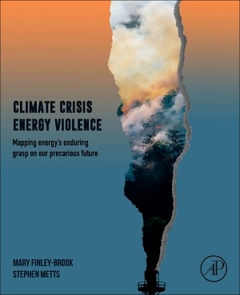Climate Crisis, Energy Violence Mapping Fossil Energy's Enduring Grasp on Our Precarious Future
Auteurs : Finley-Brook Mary, Metts Stephen

By framing the work in the context of violence, and in particular the use of metrics, the book provides a compelling and engaging argument for energy justice.
2. Research Methodology
3. Illustrative Cases
4. Comparative Analysis
5. Findings
Sustainability and environmental professionals, researchers, policy makers, governments, development agencies, community organizers, and climate and environmental activists.
Mary Finley-Brook is an associate professor of Geography and Global Studies at the University of Richmond.Finley-Brook has decades of experience conducting participatory action research and collaborates regularly with community-based organizations and frontline populations to advance climate justice in energy sector transformation.
Stephen Metts is a GIS analyst, instructor and scholar based in New York City, USA. His research and practice provides spatial analysis of urban and rural communities, with specialities in energy infrastructure, environmental justice and community impacts. As an adjunct assistant professor at The New School in New York City, he teaches graduate and undergraduate courses featuring Geographic Information Systems (GIS) mapping of global and regional issues related to land use, climate change, human rights and migration.
- Analyzes energy violence in an accessible and common-sense theoretical framework grounded in ecology, ethics and human rights
- Explores energy violence across multiple sources, sectors and geographies
- Interrogates quantifiable structural violence through homicide and repression databases
Date de parution : 11-2024
Ouvrage de 304 p.
19x23.4 cm



